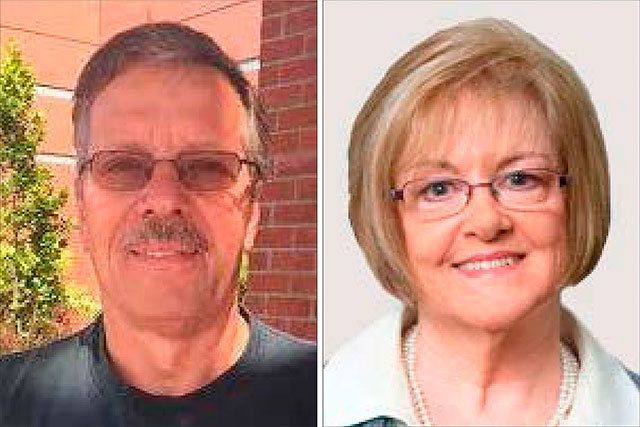EVERETT — Gordon Sibley is trying to do something that hasn’t happened in 22 years: beat a sitting Snohomish County Public Utility District commissioner on election day.
Sibley and the incumbent Toni Olson are both former PUD employees; however, their shoestring campaigns have very different platforms.
Sibley is running on a reform message, saying that his opponent and the other two publicly elected commissioners waste ratepayers’ money and have lost sight of the utility’s basic no-frills mission to deliver affordable and reliable electricity. He promises voters that he will bring tough oversight to the commission, work to lower rates and make sure the lights stay on.
Olson is running on her industry experience and her record as a two-term commissioner. Her priorities include reducing outages, adopting new technologies to give consumers more control over electricity consumption, strengthening the PUD against cybersecurity threats, advancing experimental utility-scale battery storage projects and supporting small-scale solar projects.
Olson led the primary with nearly 41 percent of the vote. Sibley finished second with nearly 24 percent. Nearly 35 percent of voters backed one of two other challengers — Larry Wagner and Dustan Bunt.
Both Bunt and Wagner have endorsed Sibley, who is trying to pick up enough of their supporters to win in the Nov. 8 general election.
“This is all new to me,” Sibley said, taking a break from putting out roadside campaign signs in Lynnwood.
“Many voters don’t realize there are publicly elected commissioners,” he said.
He plans to go door-to-door later this month with members of the International Brotherhood of Electrical Workers Local 77, whose members include PUD workers.
The PUD expects to spend at least $10 million reading meters to fix a billing problem it created, Sibley said. The commission “got us into this mess.”
“They made a mistake by going to monthly billing with estimates, and ratepayers are paying for it now,” he said.
The utility has spent millions of dollars unsuccessfully developing new power sources — from tidal and geothermal — as well as on other new technologies, such as utility-scale batteries.
That money was wasted on unproven technologies, Sibley said. “We’re not a research and development corporation.”
Olson said the projects were efforts to position the PUD to develop greater local sources of power to meet future demand. Commissioners and high-level PUD staffers often have said the utility needs more independence from the federal Bonneville Power Administration, which supplies more than 80 percent of the district’s electricity.
“We need to look for additional (sources) nearby so we don’t have to pay” another utility to transmit the electricity, she said.
One local source that the PUD has investigated for several years is a small hydroelectricity facility on the Skykomish River. The Sunset Falls project has drawn determined opposition.
The district has spent about $6.5 million studying the project over opponents’ protestations.
During an interview with The Daily Herald in July, Olson came out against the project. Projections of future demand have come down from when the PUD began studying the project. Also, it is not clear that it will pay for itself, she said.
Her new position caught many opponents off guard, said David Wick, one of the activists opposing the Sunset Falls project. He owns a cabin near the proposed site. “We were all surprised when she came out wanting to take another look at the economics of the project.”
Sibley counters that Olson’s new stance is a convenient election-year pivot, a claim she denies.
The incumbent “is questioning its need, she is not opposing it,” and could easily change to supporting it, he said.
Olson said she wants an independent analysis of the project’s viability by a third-party, such as the University of Washington.
An independent investigation conducted earlier this year determined that Olson and Commissioner Kathy Vaughn broke the state’s Open Public Meetings Act by discussing PUD business outside a public meeting.
Based on her understanding of the law, “I never conducted business or had an inappropriate conversation outside of a public meeting,” she said.
The independent investigator, Ronald Knox of the Seattle law firm Garvey Schubert Barer, was looking into allegations made by a former employee that he had faced discrimination due to his sexual orientation. The report concluded that the discrimination claims were unsubstantiated.
However, “there is evidence to support the conclusion that Vaughn and Olson met outside of Commission meetings to discuss and make decisions … in violation of Washington’s Open Public Meetings Act,” Knox wrote in his report, which was submitted to the PUD in May. The Herald obtained a copy through a public records request.
Olson said the report is wrong and the investigator never directly asked her about the matter.
The finding is based on statements from two senior PUD staffers, who both said Vaughn had admitted to privately meeting with Olson, according to the report.
Dan Catchpole: 425-339-3454; dcatchpole@heraldnet.com. Twitter: @dcatchpole.
Talk to us
> Give us your news tips.
> Send us a letter to the editor.
> More Herald contact information.

























